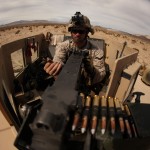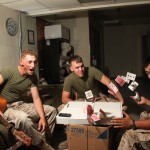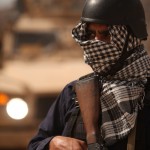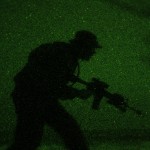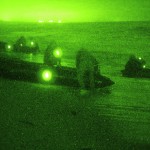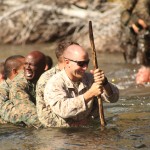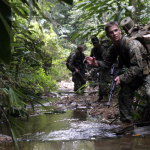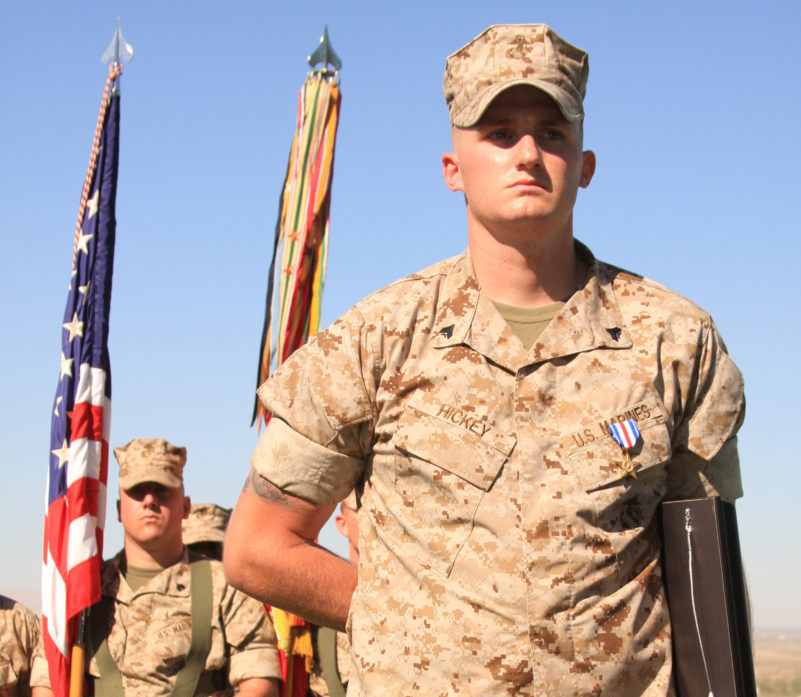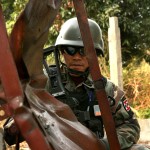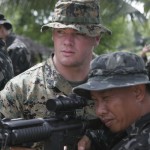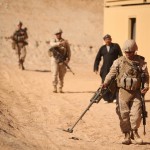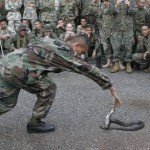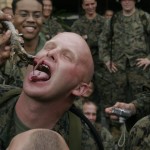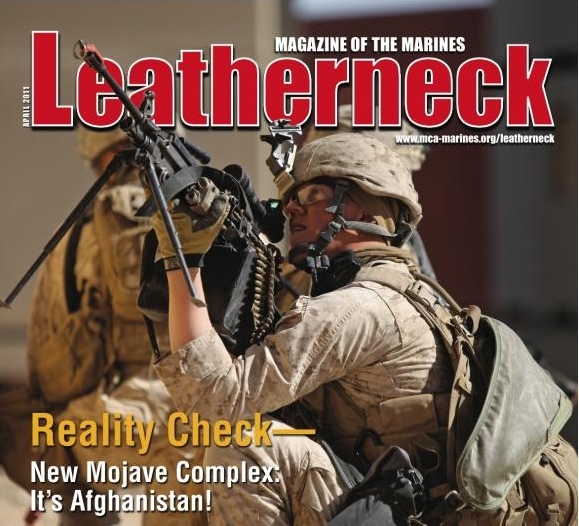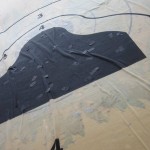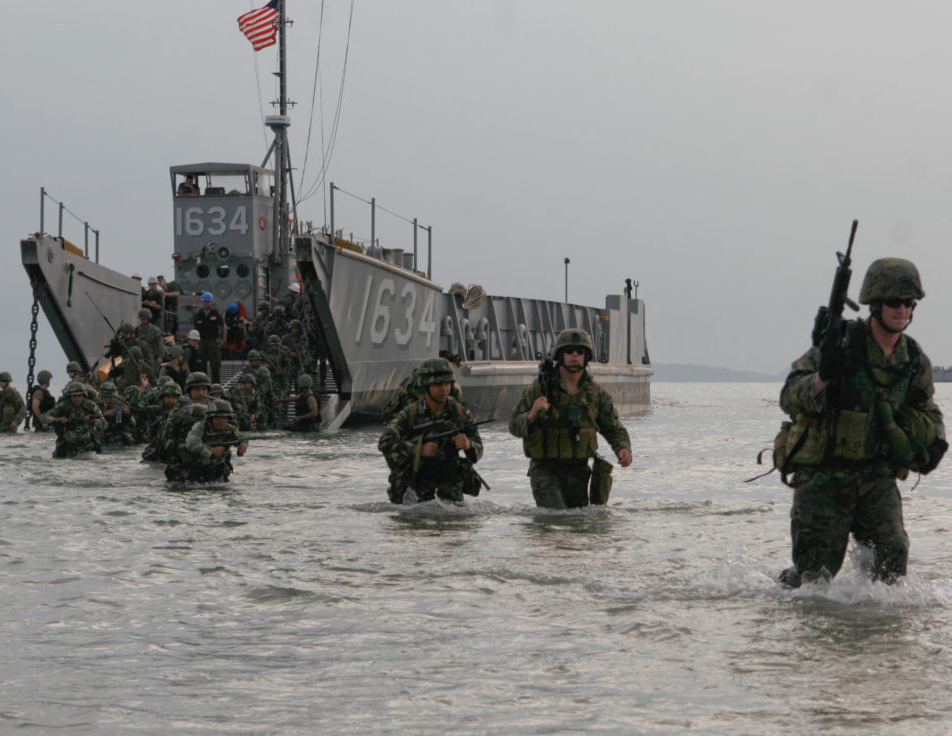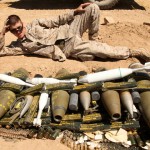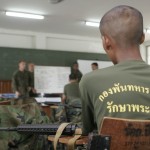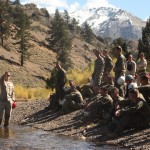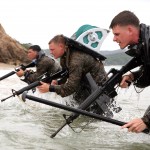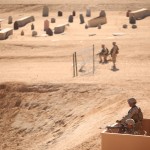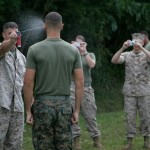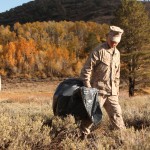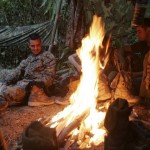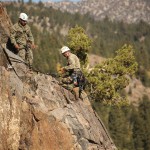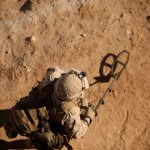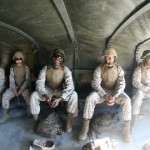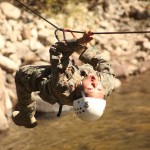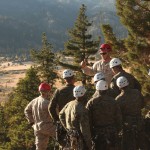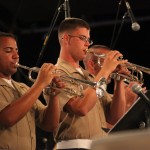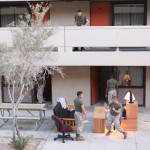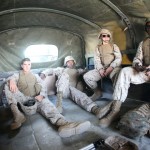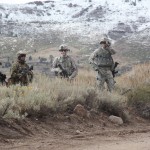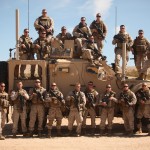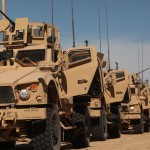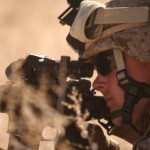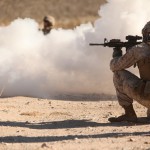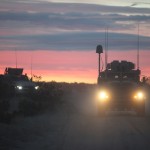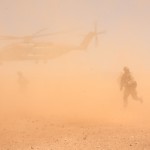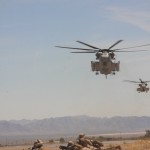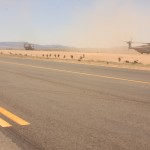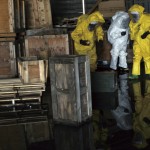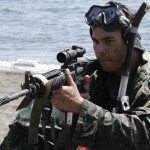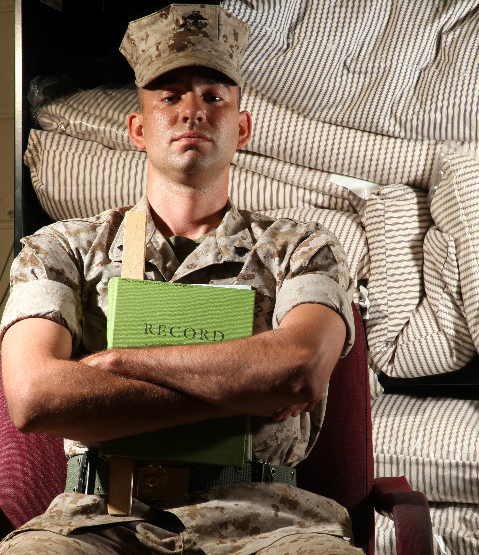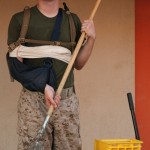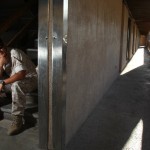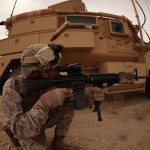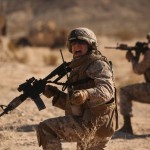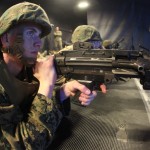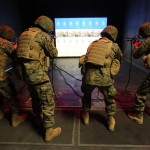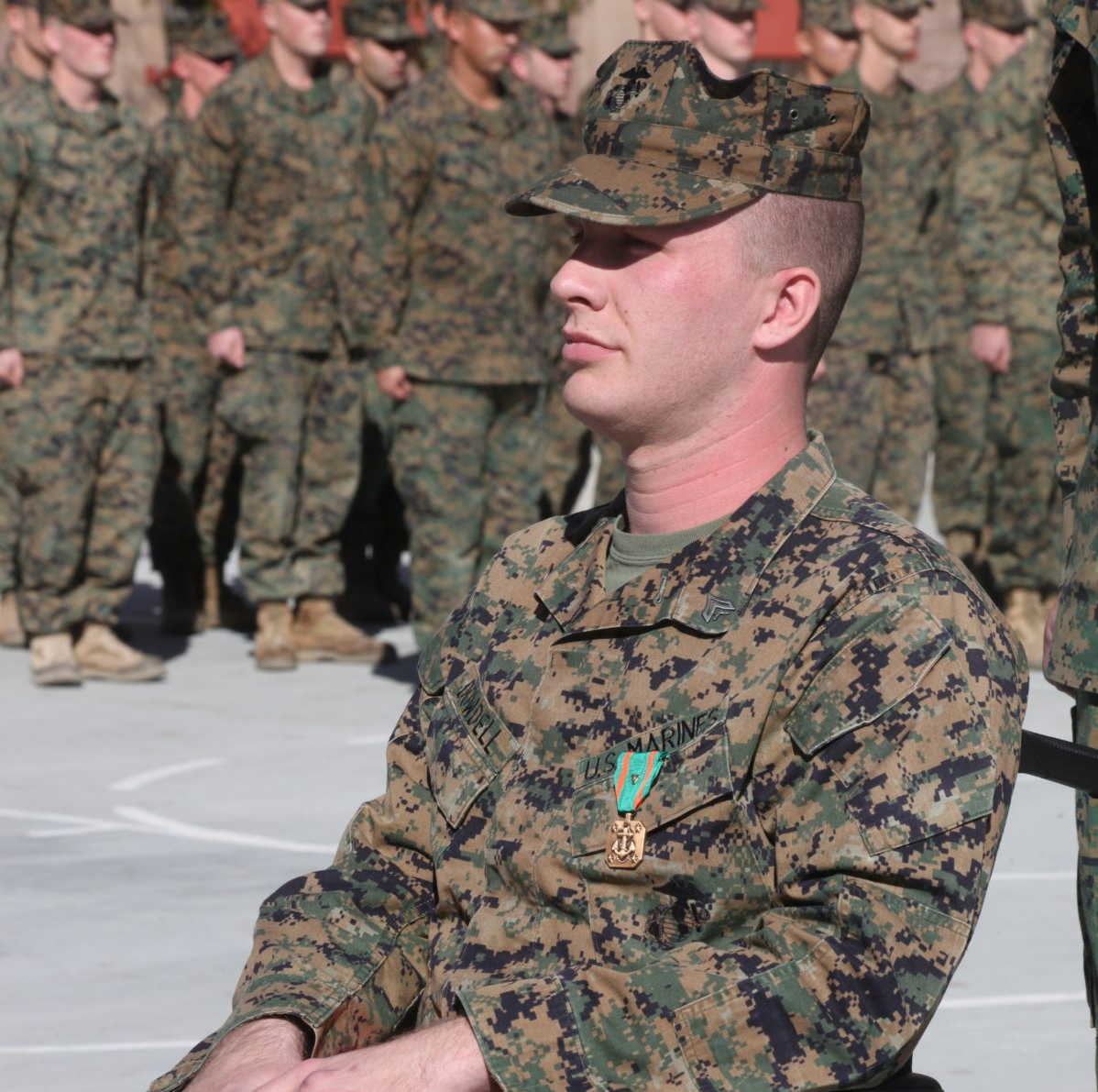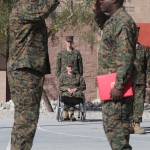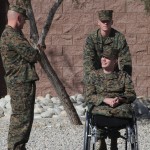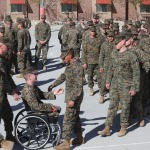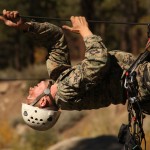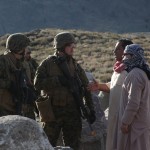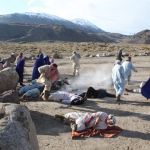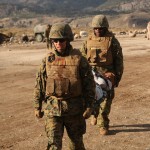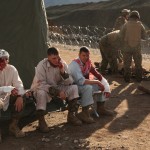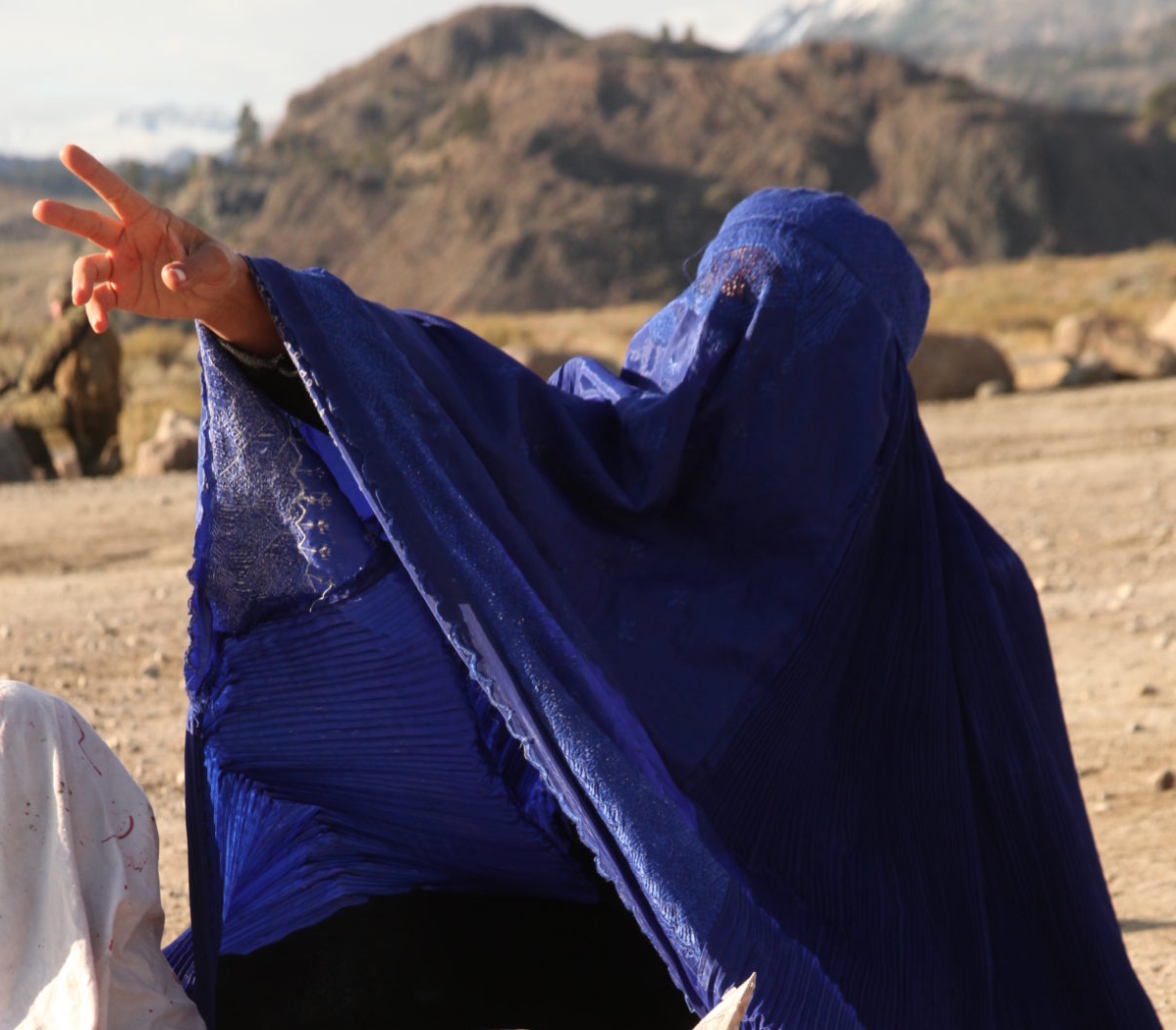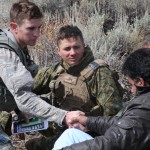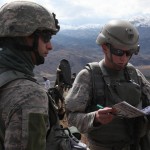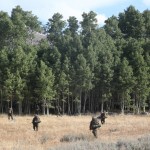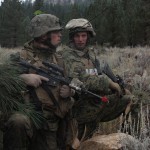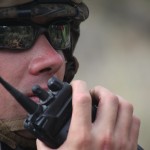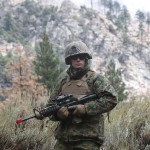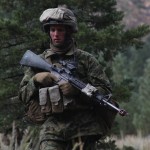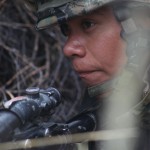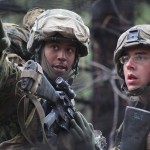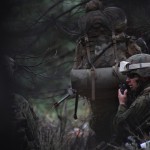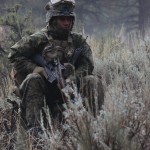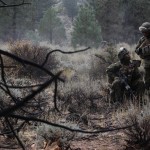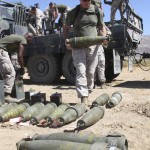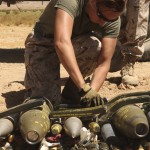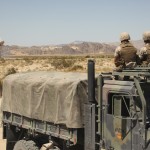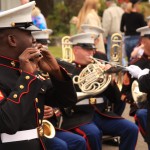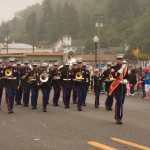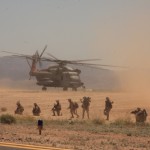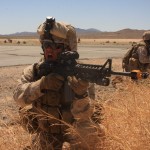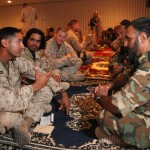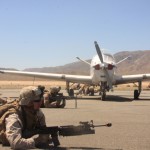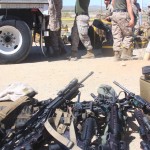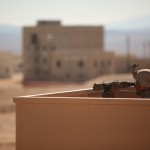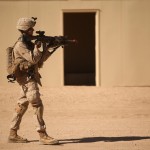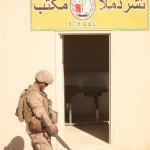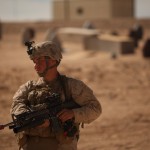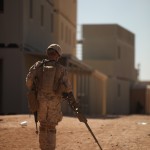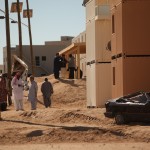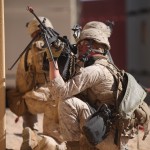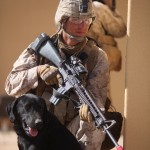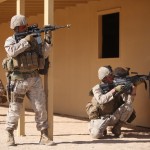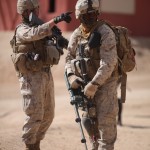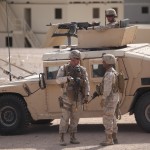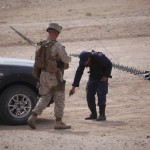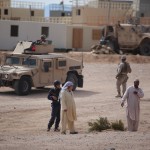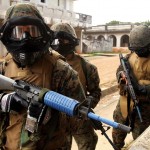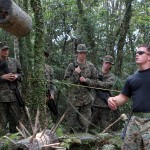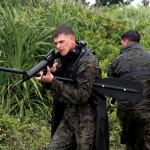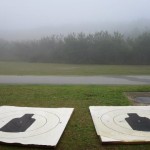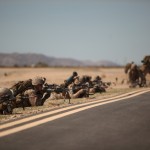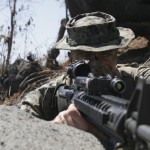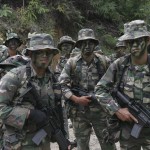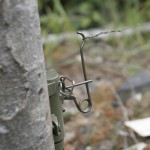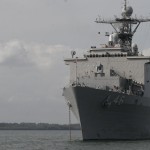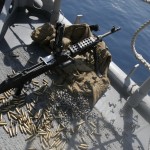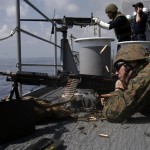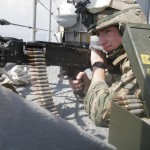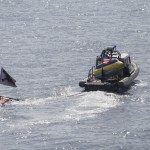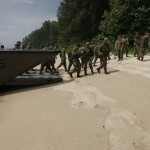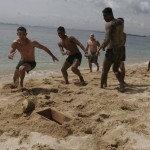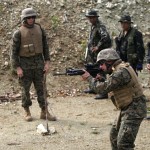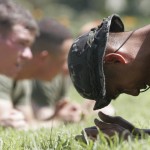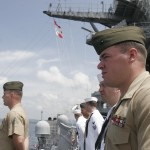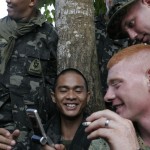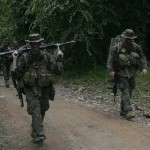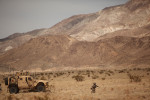As a Combat Correspondent for the U.S. Marine Corps, I created written content and imagery to inform the public about the U.S. Military, service members and their mission. Later on in my enlistment I was promoted and held supervisory positions that required coordinating the efforts of 4-14 correspondents and editing coverage for distribution.
Ancient Warriors speak to troops through Greek play
Dramatic readers used ancient Greek literature to provide a window to the past to show Marines and sailors that the battle seldom ends when the air falls silent, and that the effects of war are timeless.
The play “Ajax” consists of five scenes depicting a well-known and brave soldier, Ajax, and his emotional breakdown, which eventually leads to his suicide.
The story of the grief-stricken warrior aimed to illustrate the psychological and physical problems of some veterans returning from war, and the dangers of bottling up emotions that come with their experiences, said Bryan Doerries, founder of Theater of War, Productions.
Sophocles, an Athenian general and playwright, wrote the play more than 2,500 years ago and had it performed for his army of 17,000 soldiers.
The story the audience heard was written by warriors for warriors, Doerries said during the introduction. The way Sophocles depicts the mentally wounded warrior is one aspect of the play that relates to military members, he said. “The way he depicts what goes on in his mind and what happens after his suicide.”
The ancient literature was then put into context, matched with emotion and quickly came to life before the Marines and sailors in the Base Theater.
“The professional actors made the story,” said Lance Cpl. Austin Grey, an infantryman with Headquarters Company, 7th Marine Regiment. “The way they presented it was great and much better than other briefs I’ve had in the past,” said the Tampa Bay, Fla., native.
After the reading a four-person panel of Marines, sailors and civilians from the audience took to the stage to share their interpretations and experiences pertaining to Ajax’s suicide.
“I can relate with the story of Ajax, because as a commander, I didn’t have the luxury to show emotion,” said Maj. Trent Gibson, an assistant operations officer with Regimental Combat Team 7, who has served on two combat deployments in Iraq.
“I had to be the rock, to help focus my Marines on the mission.
“When it was over, ultimately I had to realize, ‘Pay tribute to the dead, but focus on the living,'”he said.
“Inside us, we all have weakness, fears and insecurities that make us human. As Marines, we think that we have to be machines, but we don’t. We think that having emotions makes us weak, makes us less of a man, but it doesn’t,” Gibson added.
Another panelist, Navy Lt. Cmdr. Shauna KingHollis, head of the deployment health department for the Robert E. Bush Naval Hospital, said there is a close correlation between what Ajax experienced and what she has seen from Marines and sailors returning from war.
“The timelessness- I think that through the depiction in the play, we realize these symptoms are very common in military members today,” she said.
The audience discussed different aspects of the play, comparing returning Marines and sailors, “modern day warriors,” to those of the past. “War doesn’t necessarily stop when the fighting stops. Just because his enemy was dead and buried, Ajax may have thought that the war was over, but it wasn’t,” Gibson added. “As warriors weakness is reviled. He didn’t realize he needed to face his emotions to stay strong.”
The presentation offered a unique perspective and broke the mold of the typical PowerPoint presentation, said Petty Officer 3rd Class Mitchell Groke, a corpsman with RCT-7, and a Bossier, La., native.
The Theater of War has completed 116 performances for more than 20,000 members of the military communities in the last year, 22 of them for Marine Corps audiences. In his closing remarks, Doerries offered one last thought before the Marines and sailors returned to their daily duties.
“You’re not alone. Just like you’re not alone in this room, in this country, or in the world, you’re
not alone across time.”
First female Marine advisor heads to Afghanistan
Marine Air Ground Task Force Training Command 29 Palms
MARINE CORPS AIR GROUND COMBAT CENTER, TWENTYNINE PALMS, Calif.—Some members of the Afghan National Army are in for a surprise when they meet their new instructor, Staff Sgt. Tricia McBride, the first female to receive the Advisor Training Group’s stamp of approval to advise
host nation forces in Afghanistan.
After being the first female to graduate through the Advisor Training Group’s program, McBride, from Wilmington, Del., will be deploying with a team of six to teach and evaluate Afghan military logistician instructors in Kabul, Afghanistan. Although anxious about her upcoming deployment, her voice was mixed with excitement as she spoke.
“It’s a good feeling,” she said. “To be the first at anything is good, but to be the first female especially in the Marine Corps, is just great.”
But it’s only the beginning for McBride and the rest of the team. Since the Taliban takeover in 1996, Afghan women have not been allowed to attend schools or work outside their homes, making professional interaction with women an anomaly for most Afghan men.
“Thebiggest challenge that I’m facing now is the reaction to me teaching a class,” she said recalling bits of Aghan cultural lessons throughout her training, “I have been told they’re not going to take me seriously, and they’ll just get up and walk out of the classroom.”
During the course, McBride and the team developed a better understanding of an Afghan’s perspective at the Cultural Learning Center, where they were exposed to the language and other cultural differences.
“Let’s just say I haven’t heard a lot of positive things as far as females being instructors, because the men do look at the women differently
there,” she said, launching into her intended solution.
“I’m going to show them that I’m just like the rest of the guys. I’m going to show them that, although I am a woman and I might do some things a little different, we’re all brothers and sisters. We are all here to help each other and to learn from each other. So hopefully just because I’m a woman, they won’t take that away from me.”
McBride also received courses adherent to the advisor training course curriculum, learning some basic principles of advising, such as etiquette, and common challenges that advisors face, said Capt. Ben Lawless a supply officer, instructor and assessor with the ATG.
“I think they have done very well,” Lawless said. “They have shown a thorough understanding of how to use an interpreter while executing a class to a host nation force.”
Extending his confidence to McBride’s unique challenge, Lawless continued, “Staff Sgt. McBride is professional enough that, whatever situation she encounters while working with coalition and Afghan
security forces, she’ll be able to handle it.”
The team, with their pre-deployment training behind them, is focusing on the year ahead.
“It’s going to be important for their teachers to be proficient and to convey the message properly in order to get their logistics system running well,” said Capt. Reymond Tung, officer in charge of the six-man team, and native of Potomac, Md. “I think [McBride] gives us some versatility in our team, but at the same time we understand it might pose some challenges.
“We don’t necessarily know what it’s going to be like until we get there, but we are going to have to adapt and overcome,” he said.
Marine Strives for Stronger Stride
MARINE CORPS AIR GROUND COMBAT CENTER TWENTYNINE PALMS, Calif.– For some Marines, runtimes seem like fixed numbers on their physical fitness test scores, but for Cpl. Sage Koch the times only get shorter.
A self-proclaimed average runner from Bismarck N.D. has been working on his run during the course of 11 years earning himself a spot on the Marine
Corps running team and he doesn’t plan on slowing down anytime soon.
“I was just a regular Joe like anybody else. I started from the bottom and worked my way up,” he said, recalling his humble beginnings as a runner.
His competitive stride was first put to the test in middle school, as Koch began running for the school’s track and field team. “The first event I ever ran was a mile,” Koch said, “For me, it was good for relaxation to help me
with the daily stress.”
As he progressed through to high school, he found that becoming a freshman not only meant tougher classes, but also a more serious attitude towards his running. “As I became older, competition became more a part of the picture, and along with track, I also started running cross country,” said the Bismarck, N.D., native.
Although running was his passion, not all running made him happy.
The closest he ever came to running in a sprint event was an 800, but it wasn’t by choice, he added.
“I hated that race. The coach would always put me in it so that I could get my speed up, so that I could run that faster mile.”
After graduating high school, Koch accepted a cross country scholarship to a nearby community college, but after a year decided he needed something different and enlisted in the Marine Corps
in March of 2008.
“I wanted to get out and see the world,” he said. He currently holds a three mile time of 15:19, which has earned him the name “Smoke” from the
Company A, Headquarters Battalion, First Sgt. Thomas Russi who unholsters the name every time he sees Koch in the gym.
With a runtime like that, Koch said he had trouble finding a running partner, until about six months ago.
Sarah Raschiatore, also a running enthusiast and a physical trainer at the Combat Center’s East Gym began, running with Koch and training for various running events.“Sage is very passionate about running,” she said, “He loves it and has a great positive attitude and mental strength for it.”
Although Koch is the best he’s ever been, he continues to get stronger and has transferred his focus on running longer and longer races, she said. “He’s building up his miles.” Since January, to now he has been keeping track of the miles he’s ran in base-wide competitions such as the Road Runner Challenge and other training. He has just passed the 2,000 miles mark.
The Road Runner challenge helps to keep track of his mileage and the
competition always encourages him to give it his all, he said.
“I want to run professionally, but I’ve got a long way to go. But if I keep at it I know good things will come,” he said.
Although that’s the ultimate goal, Koch sees himself back at college running competitively while he earns his degree.
“I’m running about 70 miles a week; that’s a lot, where as some professional runners run 130 or 140 miles a week.”
“People always ask me how do I do it, and I tell them, ‘You’ve just got to do it. You’ve got to push your body and your limits to get better.’”
The only way for improvement is by practice, and the best time for practice is now, he said. “If everyone starts at the bottom there’s only one way to go but up.”
Combat Center Band’s tune packs house
Marine Corps Air Ground Combat Center Twentynine Palms
REEDSPORT, Ore.— An old schoolhouse converted into the Winchester Community Center served as a gathering point and venue for the Combat Center Band and residents of Reedsport/Winchester Bay, Ore., area June 1.
As a light mist came over the pine tree-covered hills and into the bay area, the Combat Center Band, scheduled to play outside, was forced into the dry refuge of the old schoolhouse to perform.
“We weren’t sure if many people were going to show up,” said Joe Mirvis, the events planner with the Reedsport/Winchester Bay Chamber of Commerce. “The weather was poor, and announcements hadn’t been made to remind the community.”
Packed house or nearly empty, the Marines played on for the small group of residents gathered at the community center. But it wasn’t long for the Marines’ tune to echo throughout Winchester Bay to remind the residents of the day’s concert. Soon the small auditorium was filled to standing
room only.
“I was surprised that it was standing room only, that there were people in the very back standing on their tip toes to see us,” said Sgt. Matthew Heen, a tuba player with the band. “We always get a great response
from the people of Reedsport and Winchester Bay, and it was amazing that, despite the weather, people were able to come out.”
Marines, sailors, airmen train as combined fighting force
Marine Air Ground Task Force Training Command 29 Palms
MOUNTAIN WARFARE TRAINING CENTER, BRIDGEPORT, Calif.—Airmen say “jarhead,”Marines say “flyboy,” but despite the playful name-
calling, members of the two military services worked well together at 8,000 feet while conducting a cordon and search exercise at the Mountain Warfare
Training Center.
The high altitude hike helped prepare the war fighters for upcoming deployments to Afghanistan and future operations as a combined fighting force.
The Marines and sailors with 1st Battalion, 3rd Marine Regiment, along with four airmen from various explosive ordnance disposal units, worked together with Afghan role players to successfully diffuse a roadside improvised explosive device.
“This is good for us,” said Air Force Tech Sgt. Christian Mckay, an EOD craftsman with the 48th EOD. “When we are deployed to Afghanistan or Iraq, we are out there working with a lot of different services.”
After a two-kilometer hike up steep terrain, the patrol came to a small simulated village on the crest of a hill.
Second Lt. Jeremy Dittmer, the commander of 3rd Platoon, Company C, along with Air Force Staff Sgt. Robert Laney, an explosive ordnance craftsm
an with 9th EOD, sat with the town’s Afghan elders, engaging in a common practice for U.S. military members deployed overseas.
“Marines have always been trained to kill the enemy,” Dittmer said. “But in this kind of environment, with that kind of attitude, the enemy is ourselves, which makes this a great opportunity to work on our people skills.”
Dittmer explained the capabilities of U.S. medical assistance and supplies, and then offered the use of the medical staff to help the villagers. Through the use of an interpreter, the elders, now friendly and comfortable with their guests, informed the patrol of a possible IED on the edge of town.
Next it was Laney’s turn to do the talking, as he asked specific questions relating to the whereabouts and size of the threat.
Using the intelligence provided by the elders, Marines and sailors took up security positions while the Air Force EOD team probed for explosives using a metal detector and eyes trained to spot bomb materials.
It wasn’t long before a few containers, wired together and hidden behind a large boulder, were discovered mere feet from the road. After setting up the proper perimeter, a notional charge was placed by the IED for proper disposal.
After the simulation was complete, Air Force Senior Airman Ryan H
oagland reflected on the joint
exercise.
“This is all really new to me, because I’ve never deployed,” he said. “Working with the Marines and seeing how they operate was a major takeaway.”
Next: Illinois State University
[fbcomments]
